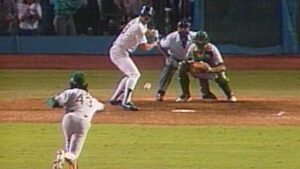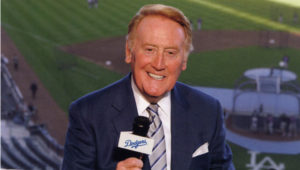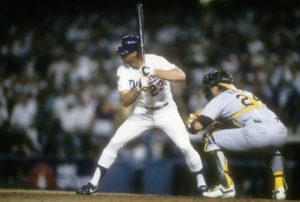by James Scott Bell
@jamesscottbell
 We all have favorite scenes from books and movies, story moments that hit us so powerfully we never forget them. One of mine is the stump clearing scene in Shane.
We all have favorite scenes from books and movies, story moments that hit us so powerfully we never forget them. One of mine is the stump clearing scene in Shane.
Then there are the moments that happen in real life. They can be little things, like the police officer who lay down on the floor to comfort a little boy.
Or they can be big, with millions of people watching. Of this variety, my all time favorite is the Kirk Gibson home run in Game 1 of the 1988 World Series. You could not have scripted it any better—a hobbled hero given one shot to save the day against overwhelming odds. Here’s how it went down.
THE BACKSTORY
The Los Angeles Dodgers had been an under .500 team for two straight seasons. Then they got the opportunity to sign a premiere free agent, Kirk Gibson, age 31. The $4.5 million investment paid off. Gibson won the National League MVP award, batting .290 with 25 home runs, 76 RBIs, and 31 stolen bases. He led the Dodgers to their first division title in three years.
In the National League Championship Series, the Dodgers upset the New York Mets in seven games. Gibson hit home runs in Games 4 and 5. But his knees were hurting. He needed injections to play. And then in the last inning of Game 5, while sliding into second to break up a double play, Gibson pulled a hamstring. Which meant he would be unable to play against the Oakland A’s in the World Series. That made the Dodgers huge underdogs.
THE SET UP
Game 1 of the Series was at Dodger Stadium. The legendary Dodger announcer, Vin Scully, was calling the game for NBC, along with Joe Garagiola.
The Dodgers scored two runs in the first inning. The fans were excited. But in the second inning, Jose Conseco of the A’s, he of the huge (i.e., juiced) biceps, hit a screaming line drive with the bases loaded. The ball scorched over the centerfield fence and actually dented a TV camera. That’s how hard it was hit. Just like that, it was 4-2, A’s.
The Dodgers got another run in the sixth, and that’s where things stayed until the bottom of the ninth. With the score 4-3, the Dodgers had to face the most feared relief pitcher in all of baseball, Dennis Eckersley. This future Hall of Famer simply did not lose ballgames. I will describe the mood of the crowd by lifting a line from Ernest Lawrence Thayer’s immortal poem “Casey at the Bat.” On that stricken multitude a death-like silence sat.
Gibson was in the Dodgers training room, bags of ice on his legs, watching the game on TV. Before the inning started, Vin Scully said the following: “If you’re in the ballpark with binoculars, your first thought would be, late in the game, is Kirk Gibson in the Dodgers dugout? The answer would appear to be no…There is no Gibson. The man who was the spearhead of the Dodgers’ offense throughout the year, who saved them in the league championship series, will not see any action tonight for sure. He is not even in the dugout.”
At which point Gibson sat up on the training table and said, “My ass.” He threw on his uniform and told the ball boy to set up a batting tee. After a few thwacks he told the boy to inform Tommy Lasorda, the manager, that he could hit.
Eckersley retired the first two batters. Lasorda sent Mike Davis in as a pinch hitter. Davis had not exactly set the league on fire. In his own words, “I sucked that season” Yet this journeyman somehow drew a walk from Eckersley! The tying run was now on first base.
And then Kirk Gibson came out of the dugout, bat in hand. As Vin Scully put it on the broadcast: “And look who’s coming up. All year long, they looked to him to light the fire, and all year long, he answered the demands, until he was unable to start tonight with two bad legs…and with two out, you talk about a roll of the dice, this is it.”
THE MOMENT
The fans at the stadium went wild. I went wild in front of my TV.
But we all became more subdued after the first two pitches. Gibson, looking feeble, fouled them off. The count was now 0-2, and I don’t think there was anyone on the planet—except perhaps Gibson himself—who thought he could survive. Eckersley himself remembers thinking, “I thought he was a lamb. I’m thinking I’m going to throw him a high fastball and he’s done.”
Meanwhile, Mike Davis was becoming a distraction down at first.
On the next pitch, Gibson hit a little dribbler up the first base line. As he hobbled toward the bag, the ball managed to roll past the foul line. A miraculous save!
But Gibson was still up there with two strikes. Eckersley’s next pitch was a ball…and the A’s catcher, Ron Hassey, almost picked off Mike Davis at first!
Sheesh, could this tension get stretched any further?
Of course it could.
Gibson fouled off the next pitch. Then another ball from Eckersley, putting the count at 2-2.
Another ball, and Mike Davis steals second!
Now we’ve got a full count, two outs, bottom of the ninth, the tying run on second. And all Gibson was thinking about was putting the ball in play to score Davis.
Then he played a little mind game on Eckersley. Just before the next pitch Gibson called for time and stepped out of the box. Let Eckersley think about it as the fans were screaming. At the same time, Gibson was remembering what a scout told him. If ever he faced Eckersley with a 3-2 count, you can bet your ranch he’ll come at you with a “backdoor slider.”
Which is exactly what Eckersley threw. Gibson stuck out his bat and flipped it with his wrists. It didn’t look like a hard swing at all, but it happened to meet the ball in just the right spot.
Vin Scully called it: “High fly ball into right field! She is gone!”
Gibson started limping around the bases. Scully, as he was wont to do, let the crowd noise do the talking for a long moment. And then, off the cuff, came up with one of his fabled phrases: “In a year that has been so improbable, the impossible has happened!”
Gibson did not have another plate appearance in the Series, but the momentum from his home run carried the Dodgers to a five-game upset of the A’s.
Now that you know the story, you can have a look at it below. For me, this never gets old:
Lesson: When you write a big scene, write it for all it’s worth. Don’t hold back! Overwrite. Feel the emotions. Stretch all tension to the limit. You will edit the scene later to polish the rough edges. You may need to scale things back a bit for a greater effect. But get that raw material down first. Then your scene will have the potential to be a winning home run.
What’s a scene from a book or a movie—or real life—that has stayed with you? Why does it work?



